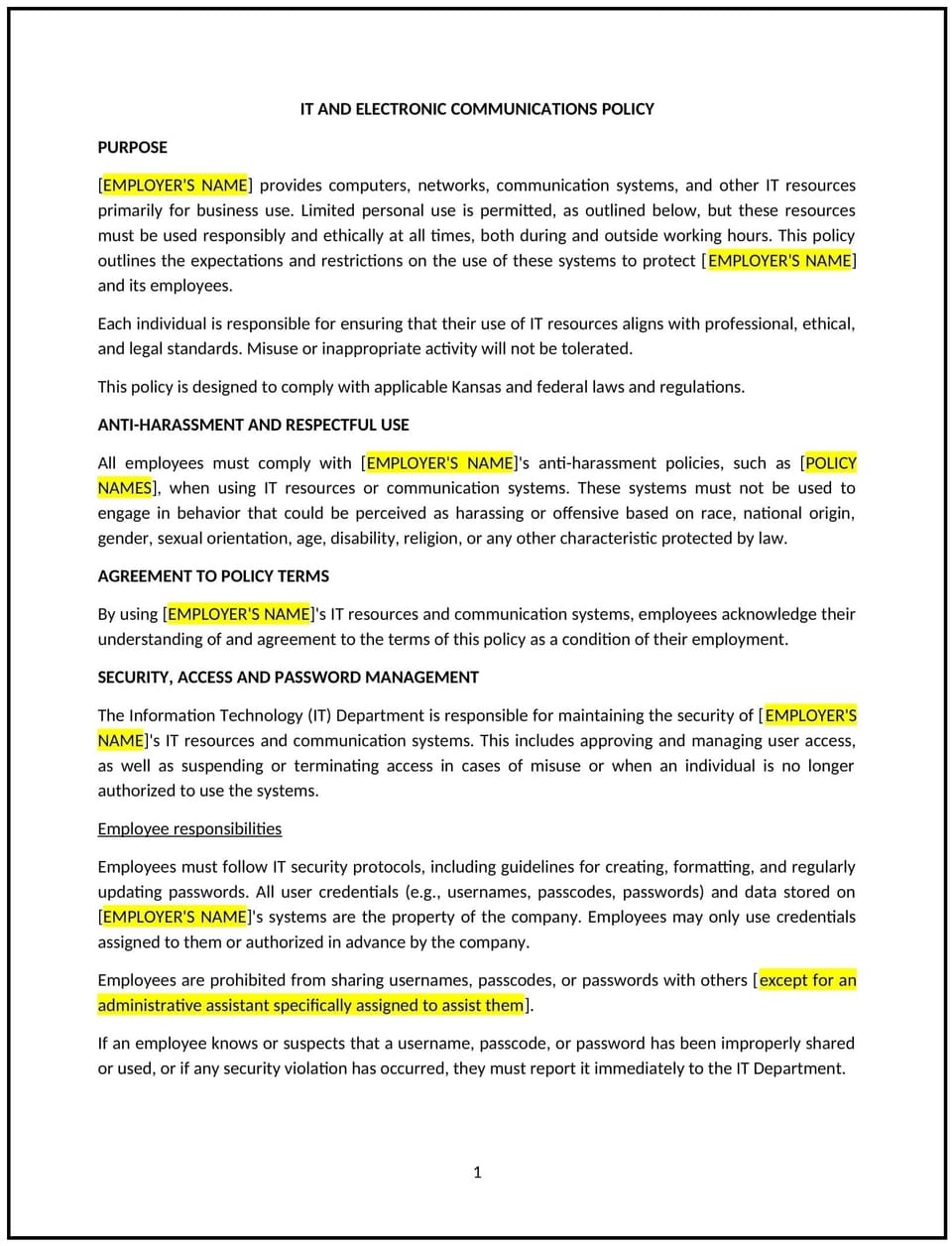IT and electronics communications policy (Kansas): Free template

International travel policy (Kansas)
An international travel policy helps Kansas businesses manage employee travel for work-related purposes outside the United States, ensuring safety, compliance with regulations, and effective use of resources. This policy outlines the procedures for booking, budgeting, and ensuring the well-being of employees while traveling internationally on behalf of the company.
By implementing this policy, businesses can minimize travel risks, streamline approval processes, and ensure that employees are adequately prepared for international work assignments.
How to use this international travel policy (Kansas)
- Define eligible travel: Businesses should specify what constitutes eligible international travel, including business meetings, conferences, client visits, training, and other work-related activities.
- Establish travel approval processes: Businesses should outline the approval procedures for international travel requests, including who needs to authorize the trip, how to submit requests, and how far in advance the approval should be obtained.
- Set travel budget guidelines: Businesses should establish guidelines for managing travel expenses, including airfare, accommodation, meals, transportation, and incidental costs, and specify which expenses are reimbursable.
- Address safety and health: Businesses should provide information on health and safety protocols for international travel, including required vaccinations, emergency contact numbers, and any travel advisories.
- Implement insurance coverage: Businesses should ensure that employees traveling internationally are covered by appropriate travel insurance, including medical, accident, and evacuation coverage.
- Require documentation: Employees should be required to keep records of their travel, including itineraries, receipts, and any relevant documents related to work tasks performed during the trip.
- Review and update regularly: Businesses should periodically review the policy to ensure it remains up-to-date with the company’s needs and any changes in international travel regulations or risks.
Benefits of using an international travel policy (Kansas)
- Enhances employee safety: A clear policy helps businesses ensure that employees are properly informed about potential risks, including health concerns or safety threats, and are adequately prepared for travel.
- Streamlines travel arrangements: By establishing clear procedures for booking and budgeting, businesses can reduce confusion and ensure consistency in travel planning.
- Controls travel costs: A well-defined budget and reimbursement process helps businesses control expenses and avoid unnecessary spending on international travel.
- Improves risk management: A comprehensive travel policy helps businesses manage risks, including travel disruptions, medical emergencies, and the safety of employees abroad.
- Supports compliance: Ensures that the business and its employees comply with relevant laws and regulations related to international travel, including visa requirements, tax implications, and safety protocols.
- Increases productivity: With a streamlined approval and support process, employees can focus on their work tasks while traveling, ensuring efficient use of time and resources.
Tips for using this international travel policy (Kansas)
- Communicate the policy clearly: Businesses should ensure that employees understand the policy, including how to request approval, submit expenses, and stay compliant with travel requirements.
- Provide resources for travelers: Businesses should offer support, such as travel concierge services, country-specific information, or local contacts to help employees manage their trips effectively.
- Offer pre-travel briefings: Businesses should provide training or briefings for employees traveling internationally, covering safety, cultural awareness, and company expectations during the trip.
- Track travel expenses: Businesses should establish a system to track expenses in real-time, ensuring employees submit accurate reports and that the company adheres to its travel budget.
- Review travel insurance coverage: Businesses should ensure that employees are aware of the travel insurance options available and the coverage they have while traveling abroad.
- Stay updated on travel risks: Businesses should monitor any international travel advisories or changes in regulations to ensure the safety of their employees and adjust their policies accordingly.
Q: Why should Kansas businesses implement an international travel policy?
A: Businesses should implement an international travel policy to manage travel risks, control costs, ensure employee safety, and streamline the logistics of business trips abroad.
Q: What expenses are covered under the international travel policy?
A: Businesses should specify which travel-related expenses are reimbursable, including airfare, accommodations, meals, transportation, and incidentals, and provide guidelines for submitting claims.
Q: How can businesses ensure employee safety during international travel?
A: Businesses should provide safety guidelines, travel insurance, emergency contacts, and country-specific health information to ensure that employees are prepared and safe during their trips.
Q: What should businesses do if an employee faces an emergency while traveling abroad?
A: Businesses should have a plan in place for handling emergencies, including a list of emergency contacts, insurance coverage for medical and evacuation needs, and clear procedures for seeking assistance.
Q: How often should businesses review and update their international travel policy?
A: Businesses should review their international travel policy annually or whenever there are significant changes in regulations, travel risks, or the company’s needs to ensure that it remains effective and current.
This article contains general legal information and does not contain legal advice. Cobrief is not a law firm or a substitute for an attorney or law firm. The law is complex and changes often. For legal advice, please ask a lawyer.


